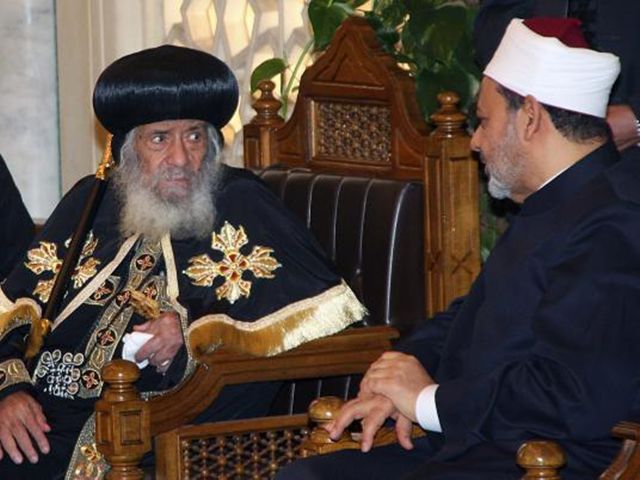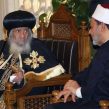
Al-Qaeda in Iraq Hopes Baghdad Church Attack Will Involve Egypt’s Traditional Salafists in Jihad
Publication: Terrorism Monitor Volume: 8 Issue: 43
By:

Gunmen from the al-Qaeda-affiliated Islamic State of Iraq (ISI) took hostages in a Syriac Catholic church in central Baghdad on October 31. About 52 people were killed and 67 injured after Iraqi security forces stormed the church. The ISI claimed responsibility for the hostage-taking and also threatened to attack the Coptic Church in Egypt if it did not release two Coptic women the group claimed were being held and tortured in a Christian monastery after allegedly converting to Islam (for the full controversy, see Terrorism Monitor, November 4).
The self-styled Ministry of War of the ISI released a claim of responsibility that included an account of the terrorist attack describing a five hour battle in which sixty Iraqi Special Forces soldiers were killed despite the intervention of American warplanes (though there is no evidence for either of these claims):
"The security apparatus responded with their usual foolishness, jumping to confrontation and giving no regards to the lives of the captives, after of course a media blackout about the demands of the mujahideen. [1] However, the sons of the Sahabah [Companions of the Prophet] were lying in wait for them. The massacre started by annihilating the first wave of apostates which tried to enter the building through the detonation of a VBIED [vehicle-borne improvised explosive device] and a number of IEDs planted around the building, which led to the death and injury of tens of those called the “Gold Team” [Iraqi Special Forces], their body parts flinging far all over the area" (Al-Fajr Media Center, November 2).
Leaders of Iraq’s Shi’a community were united in their condemnation of the attack on the church. Grand Ayatollah Ali al-Sistani demanded Iraqi security forces take stronger measures to protect Iraqi citizens and Sayyid Ammar al-Hakim, chairman of the Islamic Supreme Council of Iraq (ISCI), called for compensation for the families of the victims (Fars News Agency, November 3; al-Sabah al-Jadid, November 6). In an Arabic-language discussion on a Tehran television station, leading Sadrist Abd al-Hadi al-Muhammadawi and representatives from Iraq’s State of Law Coalition and the Fadhilah Islamic Party insisted the attack bore all the hallmarks of al-Qaeda and declined repeated invitations from the program’s presenter to implicate the United States in the attack. There were, however, suggestions that the assailants may have been supported by a country that shared their takfiri, Salafist and Wahhabi ideologies, a veiled reference to Saudi Arabia (al-Alam Television, November 3).
In Iran, a statement released by the Foreign Ministry made no mention of the controversy over the two Coptic women, focusing instead on suggestions that the attack was intended to derail efforts to form a new government in Baghdad: “Experience has shown that whenever Iraqi politicians come close to practical and logical mechanisms for the formation of a national unity government, the terrorist groups as a tool in the hand of the internal and regional streams have made attempts to foil those measures” (Fars News Agency, November 3).
In Egypt, the reaction of Islamists expectedly was against al-Qaeda’s attack and threats of further sectarian violence, but the position of Egypt’s Salafist groups remained unclear.
The Shaykh of Cairo’s al-Azhar University, Ahmad al-Tayib, issued a statement condemning the attack from France, where he is undergoing surgery. He stated, "Muslims are innocent of these crimes which tarnish the image of Islam and are against Shari’a" (al-Quds al-Arabi, February 2).
Islamists in the Egyptian opposition also denounced the attack. The Muslim Brotherhood stated that it “rejects any ridiculous accusations made against the Christian sanctuaries in Egypt from anybody and under any pretext.” Unlike the Iraqi Shiite politicians, however, the Brotherhood held “the U.S. occupation responsible for the victims of this horrendous attack” (ikhwanonline.com, November 2).
Egypt’s Islamic Group (al-Jama’a al-Islamiya) issued a statement saying that "the group rejects categorically any attempt to involve Egypt’s Copts in the sectarian fights going on in Iraq. The solution to the sectarian tension will only be achieved through the framework of the Egyptian state and via its official institutions" (egyig.com, November 4).
Egypt is currently experiencing an increase in the public activities of traditional Salafists who represent an apolitical movement and oppose al-Qaeda and affiliated Salafi-Jihadi militant groups. The activities of the traditional Salafist groups typically involve social efforts such as charity and service to local communities, but sectarian tension has recently made these groups more politically active.
These groups have arranged weekly demonstrations demanding the "release" of Camilia Shihata and following the attack in Baghdad they were preparing for even further demonstrations (Al-Shuruq, November 4). However, it seems that al-Qaeda’s attack and the further threats to Egypt’s Copts led to the postponement of new demonstrations for fear of reaction by Egypt’s security forces (Al-Yawm al-Sabi, November 4).
The sectarian tensions in Egypt are among a number of socio-economic factors which the Salafi-Jihadists of Iraq are attempting to exploit. To do so effectively they are trying to mobilize their less political rivals, the traditional Salafists. The latter have recently been empowered by the Egyptian regime to weaken the influence of the Muslim Brotherhood, but it is expected that the government will nonetheless take strong measures against the Salafists for their involvement in promoting sectarian tensions. This may in fact play into the hands of the Salafist extremists, as a conflict between Egypt’s traditional Salafists and state security services may provide an opening for the Salafi-Jihadis to return to Egypt.





